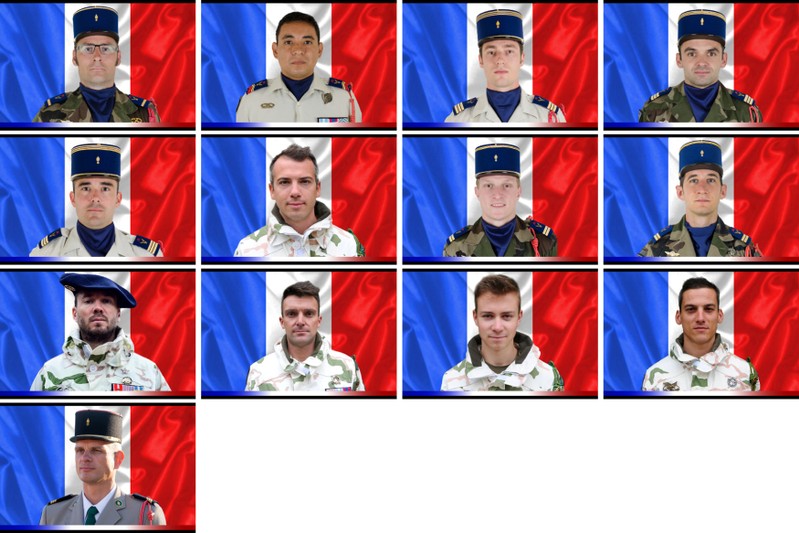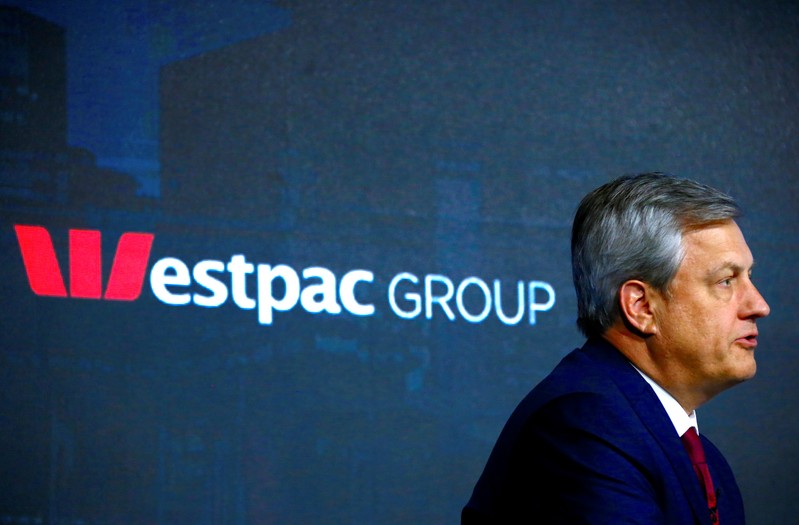
A combination picture shows the portraits of the thirteen French soldiers who were killed in Mali when their helicopters collided at low altitude as they swooped in to support ground forces engaged in combat with Islamist militants, in these handout pictures released by French Army Ministry on November 26, 2019. ADC Julien Carrette, CNE Benjamin Gireud, BCH Romain Salles de Saint Paul, CNE Clement Frisonroche, CNE Nicolas Megard, CNE Romain Chomel de Jarnieu, LTN Pierre Bockel, LTN Alex Morisse, MCH Jeremy Leusie, MDL Alexandre Protin, MDL Antoine Serre, MDL Valentin Duval, SCH Andrei Jouk. Ministere des Armees/Handout via REUTERS
November 27, 2019
By Tangi Salaün and Tiemoko Diallo
PAU/BAMAKO (Reuters) – Thirteen French soldiers died in Mali when their helicopters collided as they hunted in the dark for Islamist militants, highlighting the human cost to France of leading efforts to drive insurgents from the region.
It was the biggest loss of French troops in a single day since an attack in Beirut 36 years ago when 58 soldiers died.
The ground commandos had been tracking the band of militants through harsh terrain for several days before making contact on Monday. As night fell, an intense gun-fight erupted and aerial reinforcements were called in to pursue the militant fighters.
French President Emmanuel Macron expressed his “deep sadness” at the loss as his government said it would not back down in its fight against terrorism.
France, the former colonial power in the region, first intervened in Mali in 2013 to drive out militants who had occupied the north. It still has a 4,500-strong Barkhane force countering insurgencies in the wider region.
Rather than stabilizing, security has progressively worsened in the West African Sahel, an arid region which lies just below the Sahara desert.
Islamist militants with links to al Qaeda and Islamic State have strengthened their foothold, making large swathes of territory ungovernable and stoking ethnic violence, especially in Mali and Burkina Faso.
In a message of condolence to Macron, Malian President Ibrahim Boubacar Keita said the French soldiers “died for Mali, they died for the Sahel, they died for freedom”.
At the headquarters of the 5th Combat Helicopter Regiment near Pau in southwestern France, the mood was sombre as colleagues came to terms with the loss of seven comrades. One soldier carried white lilies through the main gate.
FRANCE BEARS BRUNT
The collision between a Tiger attack helicopter and a Cougar multipurpose helicopter occurred shortly after darkness had descended over the barren region where Islamic State is active, Armies Chief of Staff General Francois Lecointre told a joint news conference with the armed forces minister.
Two explosions were heard and the aircraft hit the ground a short distance apart. There were no survivors.
Monday’s deaths bring the number of French soldiers killed in combat in the Sahel region since 2013 to 38, officials said.
More than 200 soldiers from regional nations and international peacekeepers have been killed since September in Mali alone, with dozens more killed in Burkina Faso.
Along with the troops France maintains in the Sahel, some European countries and the United States have provided logistical support, trainers and some special forces.
A separate regional force, the G5 Sahel, made up of soldiers from Mali, Niger, Burkina Faso, Chad and Mauritania, remains perennially underfunded and hobbled by poor coordination three years after its launch.
Bastien Lachaud, a member of the French parliament’s defense committee from the hardleft La France Insoumise (France Unbowed) party, told Reuters it was time to plot an exit from the Sahel.
Paris has complained it is taking the brunt of ground operations and urged European partners to do more. But on Tuesday, Armed Forces Minister Florence Parly said support from European allies was valuable.
“We stand tall, united, resilient,” Parly told the news conference. “It is this solidarity which strengthens us, which allows us to continue the fight.”
(Additional reporting by Sudip Kar-Gupta, Elizabeth Pineau and John Irish in Paris, Anna Pujol-Mazzini in Dakar and David Lewis in Nairobi; Writing by Richard Lough; Editing by Janet Lawrence and Philippa Fletcher)

